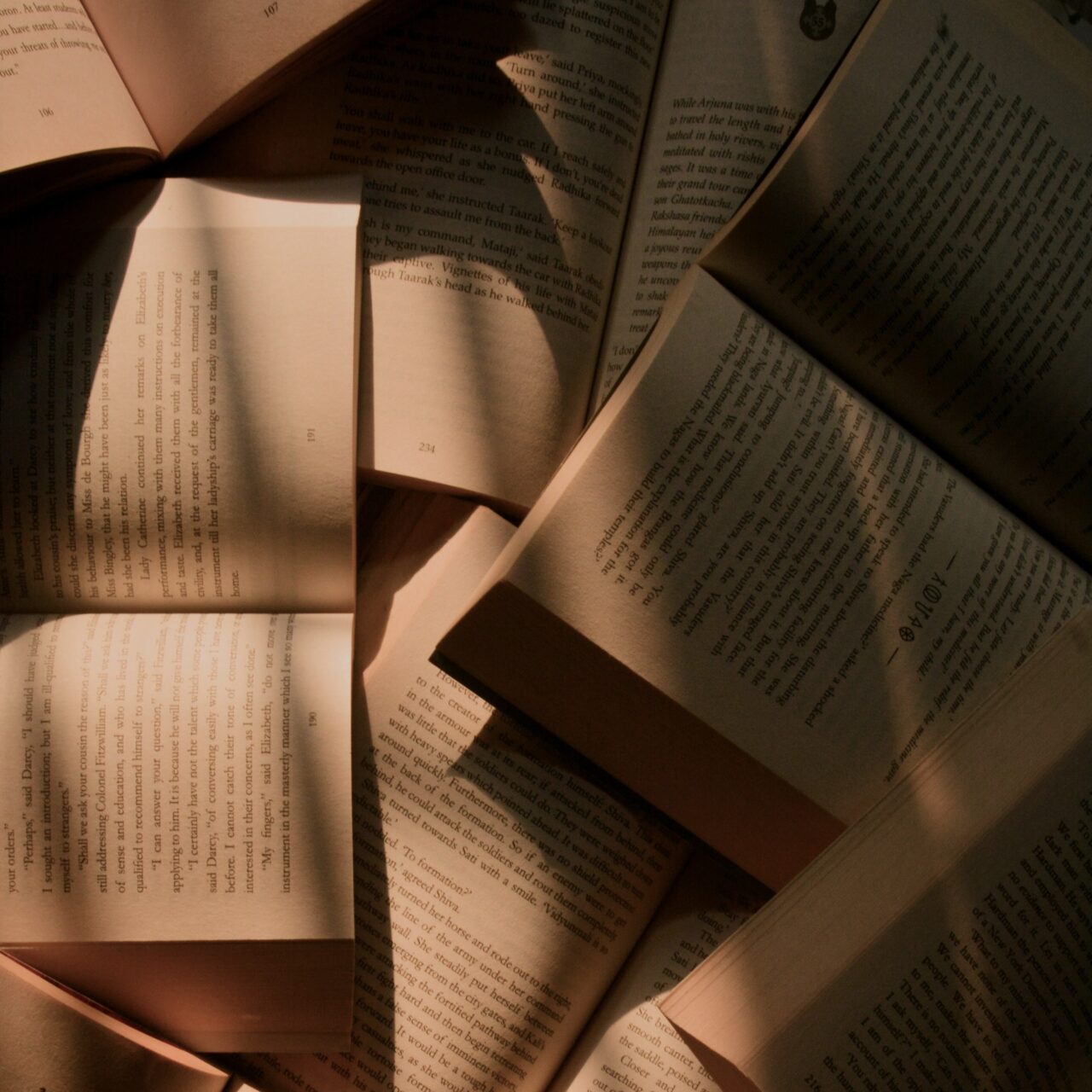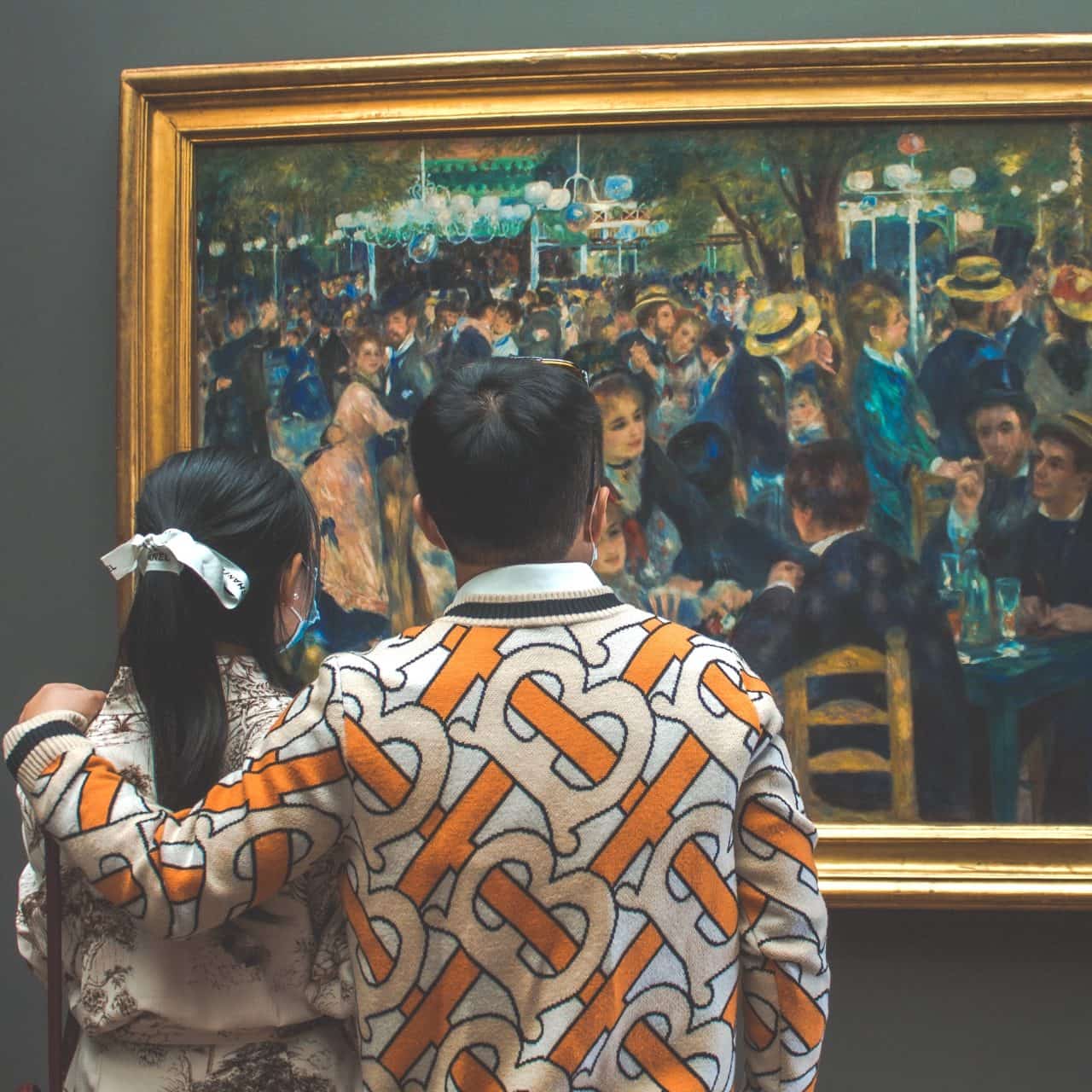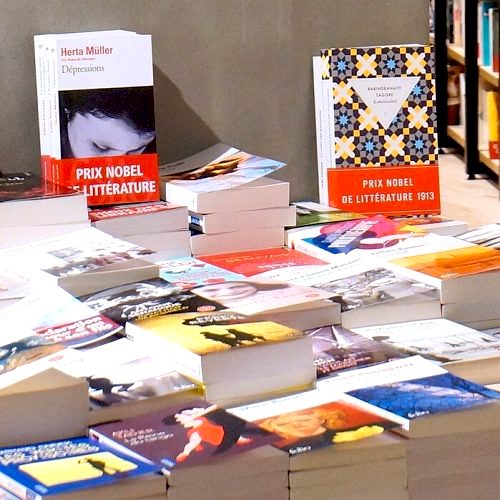What poems did you study or have to memorize in middle and high school? Maybe Langston Hughes’ “Dreams” made a special mark on you or perhaps Robert Frost’s “The Road Not Taken.” Whether you learned them with reluctance or enthusiasm, certain poems have stayed imprinted on your memory. But what poems do the les français memorize at impressionable ages? We’ve come up with a selection of classic poésie that many French people can recite by heart. Pick a poem, and try to memorize it or maybe share it with another French learner!
If you’re in NYC on June 15th, you can come attend our Poetry Workshop with Mahaut! Join us for a creative space where we’ll dive into the essence of French verse and discover its rhythms and meanings together. Get ready to be inspired and express yourself as we journey through the fascinating world of French poetry.
By Sophia Millman
“Demain, dès l’aube” by Victor Hugo
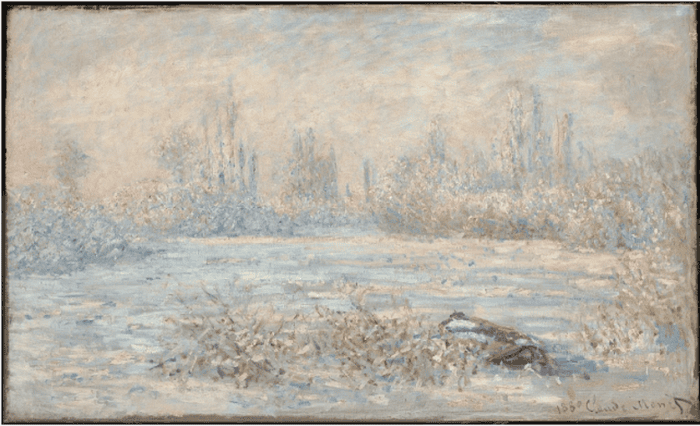
Claude Monet, Le Givre (1880)
Hugo’s most famous poem is untitled and thus known by its “incipit,” or opening words: “Demain, dès l’aube, à l’heure où blanchit la campagne…” (“Tomorrow at dawn, the hour that whitens the countryside…”). In this short, elegiac poem, written in 1856, Hugo mourns the death of his daughter Léopoldine. A poll about poems the French had to memorize at school revealed that this is the poem the French know best by heart. It’s a classic for a reason, as you’ll discover once you’ve read it.
- Read “Demain, dès l’aube” in both French and English here.
- Listen to French actress and member of la Comédie Française read the poem here.
- Buy a copy of Hugo’s poetry collection Les Contemplations here.
“Le Dormeur du Val” by Arthur Rimbaud
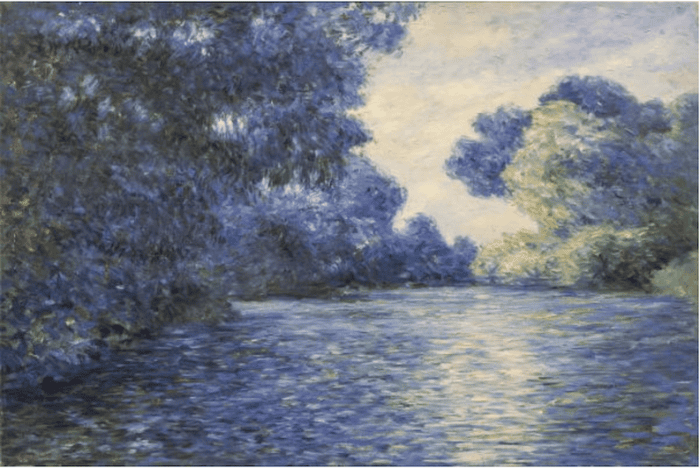
Claude Monet, Bras de Seine près de Giverny (1893)
Ask any French high school student what she had to memorize for her bac, and she’ll probably mention either “Demain, dès l’aube” or “Le Dormeur du Val.” Arthur Rimbaud was only sixteen in 1870, when he wrote this sonnet inspired by the Franco-Prussian War. Rimbaud describes a soldier lying near a river, and the reader assumes he’s sleeping until, in the poem’s famous turn, we discover that the soldier has “two red holes in his right side.”
- Read “Le Dormeur du Val” in both French and English here.
- Listen to famous French singer Yves Montand sing the poem here.
- Buy an illustrated version of the poem for kids here.
“Le Corbeau et le Renard” by Jean de la Fontaine
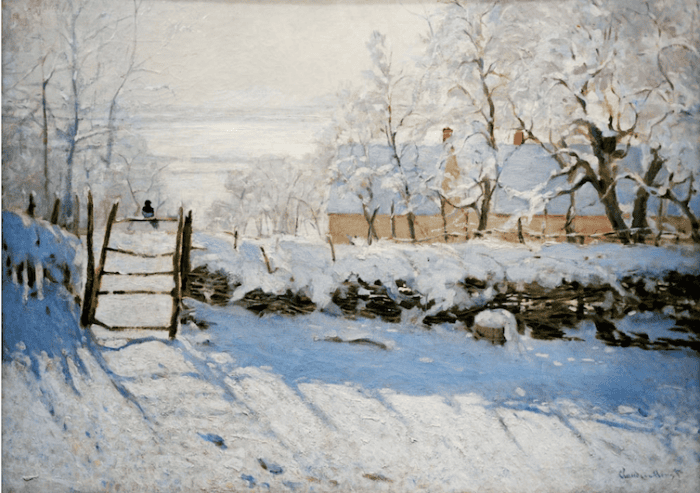
Claude Monet, La Pie (1868-9)
Jean de La Fontaine, born in Château-Thierry in July 1621, is still, to this day, one of France’s most famous poets. “Le Corbeau et le Renard,” one of La Fontaine’s most famous fables, largely resembles Aesop’s fable about the crow and the fox. While this text is called “une fable” and not “un poème” in French, its rhyming verses make it easy to memorize and to set to music. Listen to Jacques Offenbach’s 1842 version of the fable here.
- You’ll find the text of “Le Corbeau et le Renard” in French and English here.
- Buy a beautifully illustrated anniversary edition of La Fontaine’s Fables here.
“Un enfant a dit” by Raymond Queneau
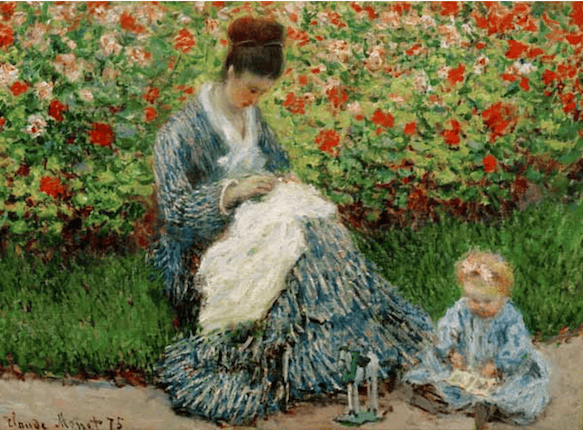
Claude Monet, Camille Monet et un enfant au jardin (1875)
If you’ve never heard of Raymond Queneau, you should add him to your list of French authors to read! A novelist, poet, and co-founder of the playful French writing group Oulipo, Queneau is best remembered today as the author of Zazie dans le metro (1959), a wonderful novel later adapted into a classic film. Listen to Queneau’s poem “Un enfant a dit” set to music here or buy a copy of a collection of his best poems for kids here.
- You can listen to another one of Queneau school poems, “L’écolier,” read aloud on FranceInter’s “Spéciale Printemps des poètes.” The recording also includes poems by Jean de La Fontaine, Victor Hugo, and Paul Verlaine.
“Chanson d’automne” by Paul Verlaine
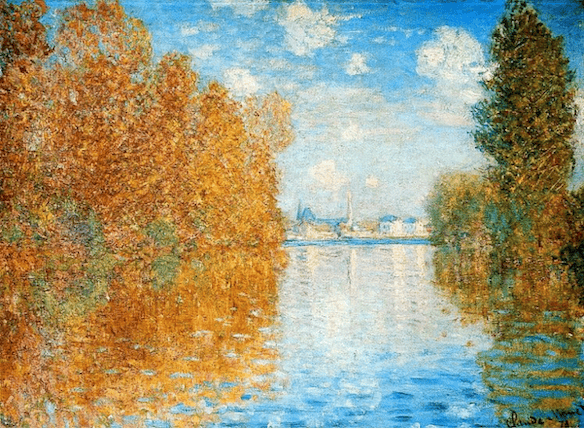
Claude Monet, Effet d’Automne à Argenteuil (1873)
Paul Verlaine’s “Chanson d’automne” (“Autumn Song”), which will be familiar to all students who have taken a Débutant class at Coucou and used it to practice the rules of French pronunciation, is one of the best known poems in the French language. It appears in his collection Poèmes saturniens, published in 1866. At the end of World War II, the BBC’s Radio Londres used the opening lines of the poem to signal the start of D-Day operations. The poem has thus become famous for its connection to the French Resistance and allusions to it appear in the songs of many musicians, including in “Verlaine” by Charles Trenet and “Je suis venu te dire que je m’en vais” Serge Gainsbourg.
- Read the poem “Chanson d’automne” in both French and English here.
- Buy an illustrated copy of Verlaine’s poetry here.
- Practice your French listening skills and learn more about Verlaine and Rimbaud here.
“Mai” by Guillaume Apollinaire
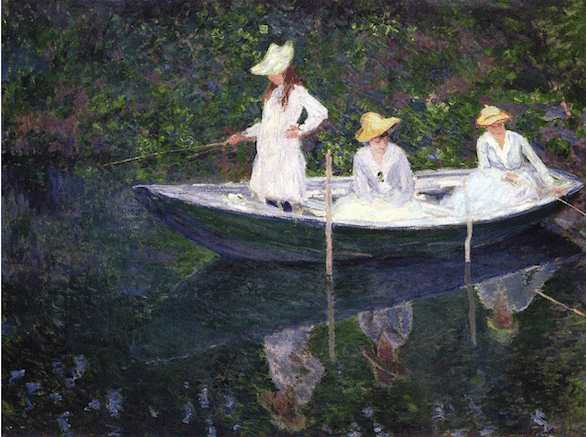
Claude Monet, La Barque à Giverny (1887)
Guillaume Apollinaire’s poems remain incredibly popular amongst French school children, so it was difficult to choose just one of his works for this list. “Sous le pont Mirabeau coule la Seine” is one of his most famous poems, and you can hear a recording of him reading it in 1910 here. We chose to feature “Mai” since we’re excited to enjoy the early summer weather soon! Written in May 1902, the poem is about women in a barque (see the boat above) on the Rhine.
- Read “Mai” in both English and French here.
- Buy a copy of Alcools, in which “Mai” was first published, here.
“Le Chat” by Charles Baudelaire
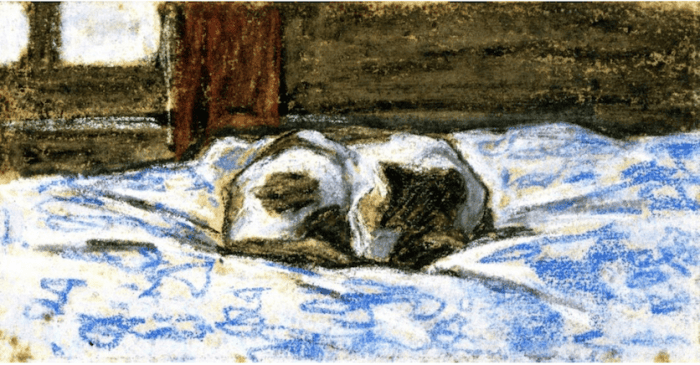
Claude Monet, Cat Sleeping on a Bed (circa 1865)
If there is one French poetry collection that you should read, it’s Baudelaire’s famous Les Fleurs du Mal (1857), viewed as “immoral” at the time of its publication. We could have chosen any one of the fabulous poems in the collection, but we decided on “The Cat” because les chats were one of the French surrealists’ favorite symbols. And when you think of 19th-century Paris and Montmartre, one of the first images that probably springs to mind is “Le Chat Noir.”
- Read “Le Chat” in English and French here.
- Listen to actress Cécile Brune read the poem here.
- Buy Les Fleurs du Mal here.
“Le cancre” by Jacques Prévert
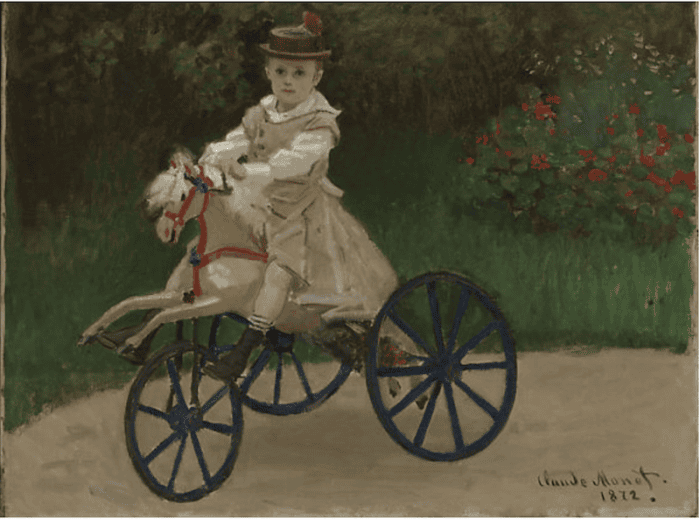
Claude Monet, Jean Monet on His Hobby Horse (1872)
One of France’s most celebrated poets, Jacques Prévert wrote playful verses for both children and adults. His 1946 collection Paroles, with its lively puns and colloquial language, remains an essential text for French students and learners. “La poésie, c’est le plus joli surnom donné à la vie” (“Poetry is the prettiest nickname for life”), Prévert famously declared, and we don’t disagree with him. If there’s one Prévert poem that all French students know, it’s got to be “Le cancre,” an ode to class clowns everywhere. We leave you with its closing lines:
avec les craies de toutes les couleurs with chalk of every color
sur le tableau noir du malheur on the blackboard of misfortune
il dessine le visage du bonheur he draws the face of happiness
A few classic French poetry collections you’ll love:
- Anthologie poétique et romanesque by Anna de Noailles
- Capitale de la douleur ; l’amour la poésie by Paul Eluard
- Mignonne allons voir si la rose et autres poèmes by Pierre de Ronsard
- Poésies complètes by Alfred de Musset
- Poésies by Stéphane Mallarmé
